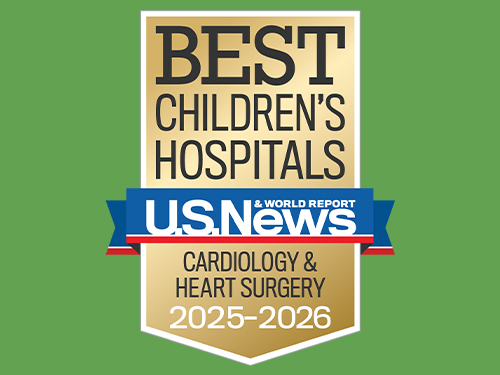By following best practices and guidelines, the Fetal Heart Program includes:
- Internationally recognized fetal cardiologists with expertise in both fetal and pediatric cardiology
- State-of-the-art fetal echocardiogram performed in The Fetal Center
- A personalized delivery and neonatal treatment plan is customized for each family. This includes the most advanced surgical and nonsurgical treatment options by nationally recognized pediatric cardiologists and pediatric cardiovascular surgeons
- Complete cardiac care from infancy through adulthood at Memorial Hermann-Texas Medical Center
- The neonatal intensive care unit (NICU) is located directly above the women’s services unit, caring for both mom and baby in the same pavilion
Fetal Heart Conditions
- Aortic Stenosis or atresia (including bicuspid aortic valve)
- Atrioventricular septal (canal) defects
- Coarctation of the Aorta (including arch hypoplasia and interrupted aortic arch)
- Common arterial trunk (truncus arteriosus)
- Congenitally corrected Transposition of the Great Arteries (L-TGA)
- Double inlet ventricle
- Double outlet ventricle (variety of types)
- Ductal constriction
- Foramen ovale restriction
- Heterotaxy syndromes (situs inversus, left and right atrial isomerism)
- Hypoplastic Left Heart Syndrome
- Hypoplastic Right Heart Syndrome (see tricuspid valve disease and pulmonary stenosis)
- Mitral valve disease (including mitral atresia and parachute valve)
- Persistent left superior vena cava (PLSVC)
- Pulmonary Stenosis or atresia
- Tetralogy of Fallot (including DORV - type and pulmonary atresia)
- Total Anomalous Pulmonary Venous Return
- Transposition of the Great Arteries (d-TGA)
- Tricuspid valve disease (including tricuspid atresia and Ebstein)
- Vascular Rings (including double aortic arch, right aortic arch and aberrant subclavian artery)
- Ventricular Septal Defects
Fetal Heart Evaluation and Diagnosis
What is a fetal echocardiogram?
A fetal echocardiogram is a non-invasive imaging technique used during pregnancy for diagnosis of heart problems in the fetus. It is safe for both mother and baby and may be repeated on multiple occasions.
How does it work?
Echocardiography uses ultrasonic waves to visualize the fetal heart and its structures and can also evaluate the heart rate and rhythm and look at blood flow in the fetal circulation. Studies have shown that prenatal diagnosis of fetal cardiac disease improves overall outcome and smooths the transition from birth to immediate cardiac care.
When is a fetal echocardiogram needed?
A fetal echocardiogram may be needed for several reasons:
- Cardiac or any other organ system anomaly associated with a heart defect is suspected on the obstetrical ultrasound (typically around 20 weeks’ gestation)
- Abnormal heart rhythm (tachycardia, bradycardia or skipped beats)
- Monochorionic (identical) twins or Multiples
Other indications for referral for advanced screening at The Fetal Center include:
- Family history of congenital heart disease
- Mother's exposure to drugs, medicines and certain infections
- Maternal diabetes or connective tissue diseases such as SLE (lupus)
- Chromosomal abnormality detected by amniocentesis or other tests (especially Down syndrome)
How early can a fetal echocardiogram be performed?
The optimum gestational age for a fetal echocardiogram is around 20 weeks, although one can be performed between 12- 14 weeks. It may need to be repeated later for optimal visualization if the fetal position is poor, if there are adverse maternal factors or if it has been performed in early gestation.
If a congenital heart defect is diagnosed, an echocardiography will be repeated during the pregnancy to allow for perinatal planning with the most current information.
What to expect when referred to The Fetal Center?
If a fetal heart defect is suspected, the team of coordinators at The Fetal Center will help schedule the following services for the pregnant mother:
- A fetal echocardiography to evaluate the baby’s heart
- A comprehensive ultrasound to evaluate fetal growth and amniotic fluid volumes
If a defect is found and/or if the patient’s care is transferred to our Center for delivery, additional services may be provided prior to delivery including:
- Further ultrasound monitoring or additional imaging (ex: MRI) will be arranged
- Consultation with the multidisciplinary fetal medicine team including genetic counselors, maternal-fetal medicine specialists, fetal cardiologists and clinical coordinators. The affiliated team will manage and coordinate the delivery and post-natal treatment plan
- Consultation with the pediatric cardiovascular surgeons, neonatologists, pediatric cardiologists, palliative care team and social services is arranged as needed to determine the plan of care required for the baby after birth
- A tour of the facilities including the labor and delivery unit and the neonatal intensive care unit
- Ongoing consultation and education is provided to families to be fully informed of the potential risks and benefits of the available treatment options for their specific diagnosis
If the suspected defect is not confirmed or specialized perinatal care is not required, the pregnant mother will then be referred back to her general Ob/Gyn for management throughout the pregnancy.




